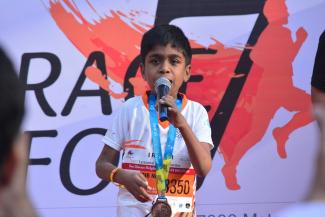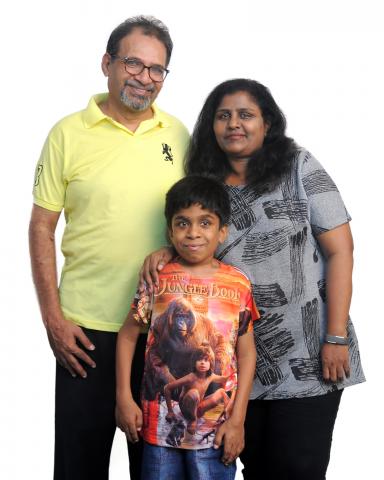
Joseph Afreddy from Mumbai shares the challenges faced by his 10 year old son Neel who has the rare disease MPS II, also known as Hunter's syndrome, the benefits of an early diagnosis and what keeps him awake at night.
Please tell us a bit about Neel’s condition.
Neel was born with mucopolysaccharidosis II (or MPS II or MPS 2), also known as Hunter’s syndrome, a very rare disease. It is a genetic disorder where the body has a deficiency of an enzyme called iduronate 2-sulfatase. Lack of the enzyme results in buildup of molecules that lead to damage in several organ systems. It mainly affects boys.
When was he diagnosed?
Neel was diagnosed to have MPS 2 on 30th April 2013. He was 3 years old at the time.
What were his early symptoms? What made you go see a doctor?
His symptoms started since birth. He would have a constant cold and runny nose, along with heavy breathing and loud snoring. In addition, he had coarse features such as a stubby nose, thick eyebrows, low palate, heavy tongue and a distended tummy.
He didn’t start walking till he was 22 months old because the joints and bones are affected. Since my wife is a Special Educator, she started him on Occupational therapy at 2 ½ years of age. Around the same time, his pediatrician suspected something and referred us to a Geneticist.
Please describe your experience of managing his condition.
We as parents were shocked and despondent on hearing the diagnosis and learning of the cost of treatment. When we learnt of the prognosis of the disease, our world collapsed.
Neel has to take a lifelong medication which is an ERT (Enzyme Replacement Therapy) which involves a weekly hospitalization for enzyme infusion. The medication is Elaprase. In addition to this he has weekly speech therapy and bi-weekly physiotherapy.
Each vial of Elaprase costs about one and half lakh rupees. Fortunately we were able to qualify and subsequently receive the medication free through DirectRelief a charitable organization. The cost of the treatment is so prohibitive that even a reasonably rich individual will find it almost impossible to manage. It is because of this medicine that Neel is alive today.
What is his present condition?
Neel is managing his ailment well and is living a near normal healthy life today. He attends school, likes to read and is a social kid. After his last surgery, his legs are straightened out giving him full movement to run and play. His frequent colds have also stopped after his tonsils were removed. He is growing tall as well. Till 2nd grade he needed help of the school side to climb the steps to his classroom but he manages on his own now. A major fall is a worry, so we try to make sure that is avoided.
The medication is to be taken lifelong. Every Saturday, he has the infusion at the Pediatric ward of KEM hospital. It takes about 2.5 hours via IV. Annually he needs to get a Liver and Spleen USG, 2D ECHO and urinalysis done. He is now almost 10 years old and has understanding of his condition. We first explained it to him when he came home one day in 1st grade asking ”why can’t I run like the other kids?”
Are there any related complications?
Neel has had to have three surgeries:
1st surgery- Adenoid and tonsil removal when he was 5 yrs old
2nd surgery- Carpal tunnel operation on both wrists at age 6
3rd surgery- Corrective surgeries on both knees for Genu Valgum at age 7
Are there any side-effects of the medicines? If yes, how do you manage them?
There are no side effects that Neel encounters although some patients are expected to have hives, fever, nausea and an increase in Blood Pressure.

Is there a family history of this condition?
No family history of MPS-2. Since we were not planning for second child, we never got tested.
What kind of specialists (including Physio/ Occupational therapist/ Psychiatrist etc) do you consult and how often?
Neel has a Physio/Occupational therapist twice a week and a Speech therapist once a week.
Have you tried complementary medicine or therapies, like homeopathy or yoga? If yes, did it help?
There are no alternative medicines.
How do you mentally/emotionally cope with his condition?
As parents it was very tough but we were fortunate that he was diagnosed and received the medication on time.
Did you see a counselor for support? Were you offered counseling by your doctor?
No we did not. As Neel’s parents we were the support structure for each other.
How did your friends treat you? Did you share your experience with them soon after diagnosis?
We have always been open about his diagnosis and condition with everyone.
What were some of the challenges you faced and what is your advice to patients who face similar challenges?
The awareness of ailments like this is almost nonexistent. Most doctors know nothing of this and are unable to diagnose it. The right period of diagnosis and commencement of treatment is three years of age; we were fortunate that Dr. Rajesh Chokhani picked up the possibility of a rare disease and guided us to a competent geneticist Dr. Mamta Muranjan who accurately diagnosed the ailment.
There are some children who get diagnosed at the age of 10 to 12, by then the disease progresses and treatment is not as effective. There are many people who advise alternative medications and pujas etc. we steered clear of all this. This disease has three modes of treatment/management: Enzyme Replacement Therapy, Bone marrow transplant and Stem cell therapy. Bone marrow transplant has a 20% success rate and there is a risk of the patient’s death, Stem cell therapy needs to have healthy cells transplanted and has a low success rate and is expensive. At the moment the best course available is ERT.
How has your child's diagnosis changed your life perspectives and ambitions?
Having a child who has a rare disease changes one’s life completely. The chances of a 'normal life' are less and things are more difficult. The disease affects soft tissues and hence joints are not as flexible. Something as routine as writing and climbing steps is challenging.
What keeps you awake at night?
We want him to be confident so he can face life. As any parent, we do worry about him and question: “What happens after we die? What does the future hold for him?”






